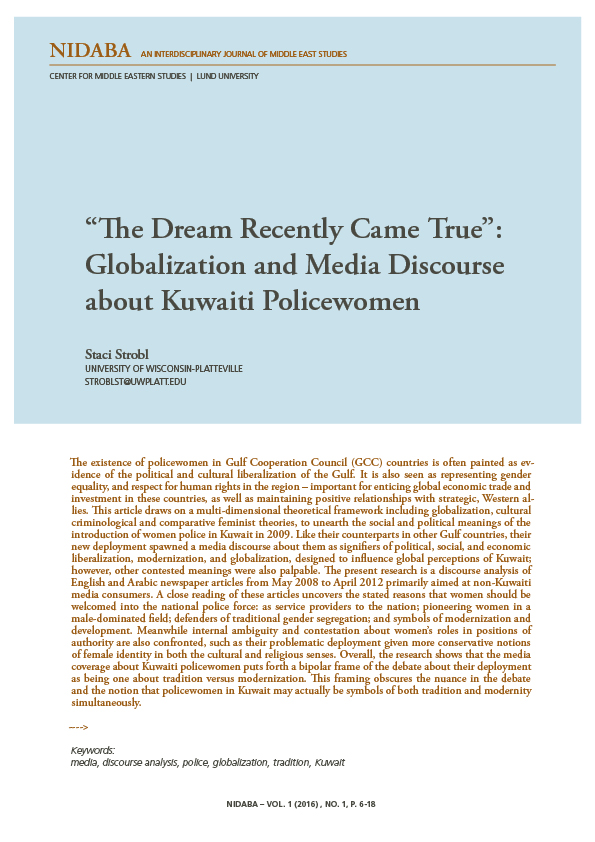Abstract
The existence of policewomen in Gulf Cooperation Council (GCC) countries is often painted as evidence of the political and cultural liberalization of the Gulf. It is also seen as representing gender equality, and respect for human rights in the region – important for enticing global economic trade and investment in these countries, as well as maintaining positive relationships with strategic, Western allies. This article draws on a multi-dimensional theoretical framework including globalization, cultural criminological and comparative feminist theories, to unearth the social and political meanings of the introduction of women police in Kuwait in 2009. Like their counterparts in other Gulf countries, their new deployment spawned a media discourse about them as signifiers of political, social, and economic liberalization, modernization, and globalization, designed to influence global perceptions of Kuwait; however, other contested meanings were also palpable. The present research is a discourse analysis of English and Arabic newspaper articles from May 2008 to April 2012 primarily aimed at non-Kuwaiti media consumers. A close reading of these articles uncovers the stated reasons that women should be welcomed into the national police force: as service providers to the nation; pioneering women in a male-dominated field; defenders of traditional gender segregation; and symbols of modernization and development. Meanwhile internal ambiguity and contestation about women’s roles in positions of authority are also confronted, such as their problematic deployment given more conservative notions of female identity in both the cultural and religious senses. Overall, the research shows that the media coverage about Kuwaiti policewomen puts forth a bipolar frame of the debate about their deployment as being one about tradition versus modernization. This framing obscures the nuance in the debate and the notion that policewomen in Kuwait may actually be symbols of both tradition and modernity simultaneously.
Authors retain copyright and grant the journal right of first publication with the work simultaneously licensed under a Creative Commons Attribution License that allows others to share the work with an acknowledgement of the work's authorship and initial publication in this journal.
Authors are able to enter into separate, additional contractual arrangements for the non-exclusive distribution of the journal's published version of the work (e.g., post it to an institutional repository or publish it in a book), with an acknowledgement of its initial publication in this journal.
Authors are permitted and encouraged to post their work online (e.g., in institutional repositories or on their website) prior to and during the submission process, as it can lead to productive exchanges, as well as earlier and greater citation of published work (See The Effect of Open Access).
The journal provides open access to all accepted manuscripts in hopes of facilitating an exchange of knowldge and informed discussion about the Middle East. Publishing with Nidaba, authors agree to the terms of the Creative Commons Attribution-NonCommercial-NoDerivatives 4.0 International License, which allows others to share the work with an acknowledgement of the work's authorship and initial publication in this journal. Authors retain the copyright to their manuscript and grant the journal the right of first publication.
The content of this journal is licensed under a Creative Commons Attribution-NonCommercial-NoDerivatives 4.0 International License.

